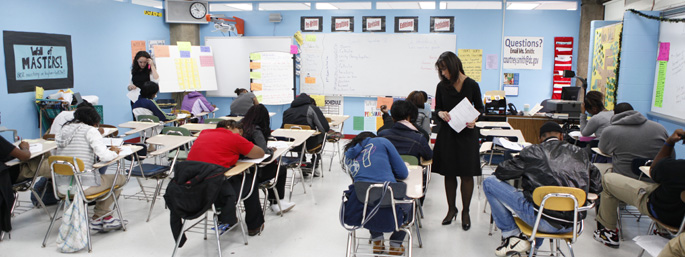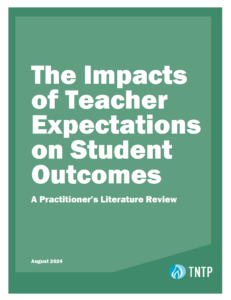A new study out last week offers a powerful proof point for policies focused on teacher quality: IMPACT, an innovative teacher evaluation, development and compensation system in Washington, D.C. is helping teachers and students improve. We spoke with Jason Kamras, Chief of Human Capital at DCPS, to hear more about how the district implemented IMPACT.
When you think about DCPS before IMPACT compared to the district as it is now, what are the biggest differences that jump out at you?
 There’s this very palpable sense that, throughout the school system, we take quality very seriously, and that we are all driven to make sure there is a fantastic teacher in every classroom, for every child.
There’s this very palpable sense that, throughout the school system, we take quality very seriously, and that we are all driven to make sure there is a fantastic teacher in every classroom, for every child.
That’s powerful for everybody in the system. It’s powerful for kids, because it means that they are getting better instruction every day. It’s powerful for parents, because they sense the system moving dramatically in a positive direction. When they drop their kids off, they feel more confident that they’ll be with a great teacher. And it’s powerful for teachers, because every teacher wants to work with talented colleagues.
I think about a fifth-grade teacher who was still new to his job when we started IMPACT. He has since said that, though it was challenging at first, he appreciated it because for the first time, he had a language to describe what he was doing and a clear, high standard for performance. He got concrete feedback for the first time and saw the connection between that feedback and his classroom, what he could do for his kids. In addition, he earned high ratings and when he got his first bonus, he was able to buy a house in D.C. He said the experience made him feel like a true professional.
Based on your experiences over the last four years, what’s the biggest piece of advice you’d offer to a superintendent who’s just about a roll out a new evaluation system?
There are three things I’d keep in mind.
First, you’ve got to sit down with your teachers. You need to go out and listen to what’s on their minds and understand what is and is not going to inspire and motivate them.
Second, you have to have a really clear north star for rigor, for what you want that system to look like. Teachers, generally speaking, want that as well. It’s important to work with them to find a high bar that honors the complexity of teaching—the art but also the science of it. It should capture the test scores, but also all of the magical work that teachers do every day with their kids and their kids’ families. Bringing all of that together is so important.
In some ways it almost doesn’t matter exactly what all of the pieces in the evaluation system are—there is all sorts of debate about how much emphasis to put on student achievement, which rubrics to use for observations, et cetera. No matter what you pick, you’ve got to clearly explain it and then implement it consistently, fairly and accurately. That means having good data systems, in particular. When money and jobs are on the line, you’ve really got to do this right.
Third, you’ve got to have a commitment to continuously learning. We didn’t get everything right the first year, and we keep learning and responding to feedback from teachers, parents and kids. As long as you’ve made that commitment to continually grow, you’re on the right path.
Teacher development was an explicit goal of IMPACT from the start. What have you done to help schools actually deliver on that promise?
That’s one of the most exciting things about this study—IMPACT did lead to improved teacher practice. It is so exciting to have independent corroboration of that.
Some of it was built directly into IMPACT, but lots of things have grown out of it since we started. We built in observations multiple times over the year, including concrete feedback. Whether it’s from your principal or content-based peer evaluators, it’s very powerful and eye-opening.
We have also begun to grow the role of master educators to also do targeted professional development, linked by content area. This year, they are working with all of the new teachers in a group of 40 of our lowest-performing schools, to observe them and develop individual, concrete PD goals. In addition, we have instructional coaches in every building that use data generated by IMPACT to guide support and targeted PD for teachers.
Going forward, we want to do even more. I’m most excited about the evolving roles of master educators and coaches to provide best possible supports to teachers wherever they are on the spectrum – new teachers, those who are experienced but still growing, or those near the top of their game.
To that end, what have you done to ensure that IMPACT supports high-performing teachers, so that they don’t view evaluations as just a bureaucratic burden?
In response to their feedback, they now have a reduced observation load. It didn’t make sense to use our limited resources to do as many observations for those folks, and now principals can focus their time and energy on teachers at the other end of the spectrum.
But we also want to make sure that we’re helping highly effective teachers become even stronger. So this year, we’re observing high-performing teachers and looking at research to try and demystify the key practices that catalyze when performance moves from good to great. We’re also looking into non-traditional means of delivering professional development and feedback (like video-based feedback, for example). We want to figure out how to train teachers right on the cusp—and not on 100 things, but on the few, substantive things that will really get them over the threshold to greatness. We aim to roll those supports out next year.
One of the biggest decisions superintendents face in implementing new evaluations systems is how to include input as you make tweaks along the way, and how to handle the inevitable situation where you get pressure to compromise. How do you do that in DCPS?
We’re constantly in conversation with teachers, and we get feedback from the union as well. Every year, we conduct a set of teacher focus groups, and every two years, we do a much more intensive set of focus groups as we consider and implement major changes. So we step back and reflect in the interim years, and then every second year we go a little more deeply as we fine-tune. That’s when we get some of the best ideas for tweaks.
For example, teachers told us, “Sometimes I have a really bad day, and that’s when the observer comes. It would be great if one of my scores is dramatically lower than the rest, you could drop it.” So we explored that, and determined that that was something we could do without compromising the system. So now, if someone’s score is a full point lower than their other scores that year, we don’t consider it. Also, for new teachers, now the first observation of the year is informal and doesn’t count toward their scores. We also were able to address some consternation around value-added, by reducing its weight from 50 percent to 35 percent, and adding 15 percent for other teacher-driven measures of student achievement, so teachers can showcase the work that their students are doing. We feel very strongly that value-added is one of the best, fairest ways to measure teacher impact on student performance, but those scores come late in the year and aren’t currently available for folks who don’t teach math or reading, so this was an adjustment we were able to make.
Overall, we want to make sure we consistently maintain a high bar while at the same time, doing it in a way that affirms the complexities that teachers face. We try to balance those things. And we’re seeing that as the number of teachers rated highly effective increases, so do our student achievement rates. We see these things moving in concert, which is exactly how it should be.
What’s the one thing about IMPACT that you’re most focused on improving right now?
We’re thinking about how to evolve the supports we can offer teachers, so we can help folks grow no matter where they are on the spectrum. In addition, we have a lot of supports and resources for teachers, but we need to bring more focus and clarity to all that. We need to be strategic and disciplined. Teachers are so busy, and can be so overwhelmed—we want to be smart and target their time and energy on areas that will make a dramatic different for them and for their kids.
But overall, and I’m talking as a former DCPS teacher myself here, I’m just so impressed by the teachers we have in DCPS. I think that the test scores that we saw last year are a testament to the great work that they are doing, and that our principals and families are doing, every day. The study is great news—but the most important message that should be coming out here is not just that IMPACT is working, but that it’s working because we have outstanding teachers leading our classrooms every day.







